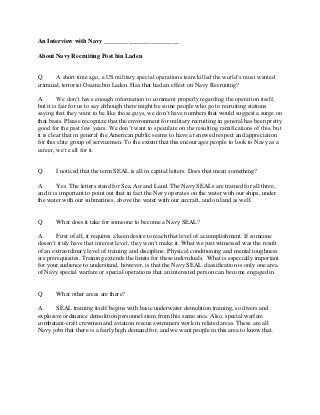
Post bin laden
- 1. An Interview with Navy ________________________ About Navy Recruiting Post bin Laden Q A short time ago, a US military special operations team killed the world’s most wanted criminal, terrorist Osama bin Laden. Has that had an effect on Navy Recruiting? A We don’t have enough information to comment properly regarding the operation itself, but it is fair for us to say although there might be some people who go to recruiting stations saying that they want to be like those guys, we don’t have numbers that would suggest a surge on that basis. Please recognize that the environment for military recruiting in general has been pretty good for the past few years. We don’t want to speculate on the resulting ramifications of this, but it is clear that in general the American public seems to have a renewed respect and appreciation for this elite group of servicemen. To the extent that this encourages people to look to Navy as a career, we’re all for it. Q I noticed that the term SEAL is all in capital letters. Does that mean something? A Yes. The letters stand for Sea, Air and Land. The Navy SEALs are trained for all three, and it is important to point out that in fact the Navy operates on the water with our ships, under the water with our submarines, above the water with our aircraft, and on land as well. Q What does it take for someone to become a Navy SEAL? A First of all, it requires a keen desire to reach that level of accomplishment. If someone doesn’t truly have that interest level, they won’t make it. What we just witnessed was the result of an extraordinary level of training and discipline. Physical conditioning and mental toughness are prerequisites. Training extends the limits for these individuals. What is especially important for your audience to understand, however, is that the Navy SEAL classification is only one area of Navy special warfare or special operations that an interested person can become engaged in. Q What other areas are there? A SEAL training itself begins with basic underwater demolition training, so divers and explosive ordinance demolition personnel stem from this same area. Also, special warfare combatant-craft crewmen and aviation rescue swimmers work in related areas. These are all Navy jobs that there is a fairly high demand for, and we want people in this area to know that.
- 2. Q Does this geographic area produce many of these specialty people? A Actually, yes. During my time here our recruiting district has had a lot of success bringing many of these people into the Navy, but I also think it is important to point out that the Navy has many other specialties, including ones that probably were involved in this most recent operation. Without taking any credit away from the SEALs or any other special forces, we have to point out that there were aircraft crews who delivered the special forces, undoubtedly also standby and support personnel in a number of specialties, and credit has to go to the intelligence and cryptographic people who figured out what was going on. While it might not have been Navy personnel in each of these categories, certainly it is important to note that Navy does have all of these kinds of jobs. We hope that people come to see us about what we have available. Q Do you have certain jobs that you especially want to fill? A Fit versus fill is the philosophy of the Navy, so it is important for us to make sure we have the right people in the right jobs. Certainly special warfare and special operations is an area where we want to attract the best possible people, so we will always welcome applicants. Also, we actively search for people who want to become specialists in the nuclear arena. Navy has roughly the same number of nuclear power plants as there are commercial ones on land across the nation. Also, we have room for prior service personnel and for a number of reserve categories, especially clergy, physicians, dentists and other healthcare related people. Q How does one get started pursuing some of these opportunities? A Actually, the best first step is to contact the local recruiting station to find out about any and all of the jobs that we have available. To reach us, simply contact our station by calling ______________, or stop in most afternoons at _________________________________. If you or an out of-town friend want to locate another station near them, visit www.navy.com and click on “find a recruiter” on the right side of the home page, then enter your zip code number. A call to 800-4go –Navy will do the trick as well. Additional comment: To put the Navy’s role in perspective, you need to recognize that 70 percent of the world is covered by ocean, 80 percent of the world’s population lives along coasts and 90 percent of the world’s commerce travels by water. Protecting all of that is our job, and that makes America’s Navy a global force for good. Sailors serve on land and from the sea; from ships on the water, submarines under the water, and planes and helicopters over the water – all to meet America’s threats far away so that those threats cannot harm us here. We welcome the best men and women to join us in accomplishing today’s missions and meeting tomorrow’s challenges.
